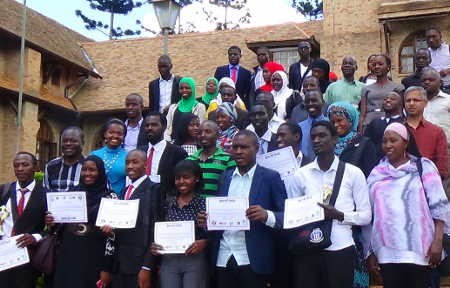Jane, ” Jane loudly voiced her views in a taxi, eliciting support from a number of other women.
Jane represents the millions of women in Uganda, young and old, educated or not, rich and poor who continue to suffer different forms of pain arising from physical, emotional, sexual and economic attacks mostly from their male counterparts in places they call home.
And the culture of abusing women by men, simply because of their gender, is stark in Uganda, more so in rural areas where attachment to traditions that elevate men over women are deep rooted.
This week, Oxfam Uganda joined a number of other agencies including YADEN, Network Debate, We Can alliance and ACORD to raise awareness about the vice of violence against women in Uganda.
The sensitization drive, came through a debating contest between students of four major universities Makerere, Kampala International University, Islamic University in Uganda (IUIU) and Uganda Christian University (UCU) with the view to inculcating in them values that promote respect for women.
The events were also held in different places to mark 16 days into November 25 to December 10, that were designated by the United Nations as days to fight against gender based violence.
Students staged powerful and exciting speeches, presentations and drama skits on the various forms of abuse suffered by women in Uganda.
Asia Tusiime, a second year law student from IUIU moved the audience with her powerful criticism of several of Uganda’s traditions and cultural practices such as Female Genital Mutilation (FGM), payment of bride price which she said demean women.
Other debators argued that culture is not solely to blame for violence against women. They cited the media as a cultural tool that objectifies women through their portrayal as sex objects.
Youth culture including the use of alcohol, wearing of skimpy dresses, drug use, the desire to get rich quick were recited as common but dangerous tendencies that as expose young women to abuses from men.
UIUI students beat their counterparts from other universities to take home the top honour as the best debators.
Worryingly however, it seems, the level of violence against women in Uganda is at an alarming level and one of the worst in the world. According to Uganda Demographic & Health survey 2011, 56% of women aged between 15-49 years reported having experienced violence since the age of 15.
Violence against women from their spouses is reported at 37% of the women who experienced violence while teachers ranked highly as perpetrators of violence towards children at 57%, followed by step-mothers or mothers at 24% and step fathers at 21%.
The war against the vice needs the participation of every one because it is in everyone’s best interests to end the vice.
As Lucy Den Teuling, Oxfam’s Social Rights Programme officer noted, ending gender-based violence is in men’s best interests too. She stressed however that young people must lead the campaign because they have a bigger stake in the future but also because they are still at a point where they can change many things relating to the treatment of women.
“Harmony is the source of happiness in any marriage,” said Teuling who urged students to lead the campaign to sensitize their peers, community and family members to end the vice.
Lucy blamed weak implementation of existing laws in Uganda that were enacted to stop mistreatment and exploitation of women based on their gender.








